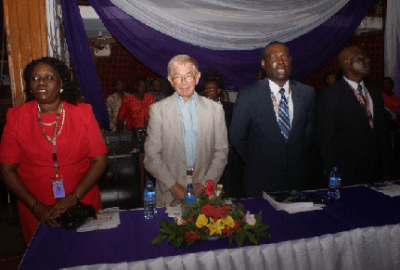In line with Pfizer contribution to the advancement of medical knowledge and its demonstrated commitment to world class medical education, capacity building and excellence in the pharmaceutical industry, Pfizer has just participated at the International Symposium/Doctoral Colloquium, held at the University of Benin.
In his opening remarks, the Vice- Chancellor, Prof. Orumwense ably represented by Prof. Abiodun Falodun, expressed the determination of the institution to be a very strong research-based institution in all academic fields, adding that it was a privilege to have a guest lecturer, a professor of Pharmacology from the University College of London.

Appreciating the University authority for bringing such a distinguished academic like Prof. Humphrey Rang, on behalf of the College of Medical Sciences, Prof. V.I Iyawe, expressed the desire of the students and staff of the college to have more of such programmes organised in the institution.
Speaking at the conference, titled “Drug discovery in a changing world”, Rang disclosed that over the past 50 years, new therapeutic drugs have been exclusively discovered and developed by the Pharmaceutical industry which has transformed modern medicine. The rate at which new medicines are introduced remain high. Despite its antecedents, herbal medicine practices of Pre-history, and the origins of apothecaries trade in the middle ages, science-based drug discovery was impossible (with a few exceptions) until the scientific coming –of –age of the key disciplines.
A professor of Pharmacology from the University College of London, Rang called on governments to invest in research into drugs and cure to advance medical practice in the country.
He reiterated that the increasing emphasis on identifying and exploiting new drug targets, a strategy exemplified by the development of the first beta-adrenoceptor blocking drugs, ACE inhibitors and strains proved highly successful towards the end of the 20th century and the industry produced many profitable block buster drugs.
He posited that in the last 30 years, most notably, the growing importance of molecular cell biology and genomics, have provided many new techniques and therapeutic opportunities, but also thrown up new challenges for the industry.
Rang enumerated the benefits of modern medicine, saying the rate at which new medicines are introduced remained as high as ever.
He said drug discovery depended largely on the support of the government because of huge financial involvement just as he called for international donors supports.For instance, he said it cost him $1 billion to get into the discovery of drugs for certain ailments.
A professor of pharmacology at the University of Benin, Professor Hope Obianwu also noted that over 4 million Nigerians are sickle cell anaemia patients.
He said the only cure for sickle cell “though funny” is marijuana which is identified as a narcotic. My research on sickle cell anemia which we have used and proved the efficacy is Indian hemp for the proper treatment of sickle cell anemia “that is the good, the bad and the ugly side of marijuana.
Representative of Pfizer Pharmaceutical Company at the event, Luke Agbo said Pfizer Company in partnership with the University of Benin believes in making the world a healthier place. “Partnering with the university in programmes like this will help expand the broad of knowledge.” He said.
He added that, the lecture exposes students and stakeholders in the medical sector the opportunity to appreciate science noting that,” Pfizer is doing a lot of work to enable our local scientists to develop strengthen that capacity and also trying to create an enabling environment for young intellectuals, particularly the medical and pharmaceutical students.”













